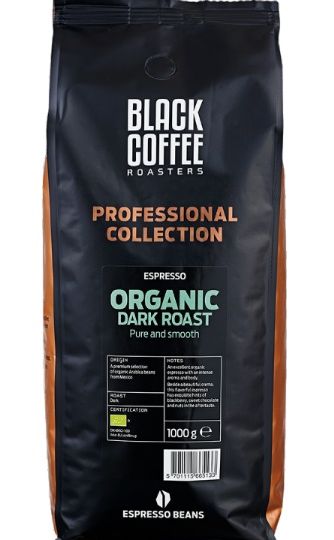
Organic Black Coffee: a term that resonates with purity and quality in the coffee industry. This beverage, made from beans grown without synthetic pesticides or fertilizers, offers a cleaner, more natural option for coffee enthusiasts. Organic certification plays a crucial role, ensuring these coffees meet stringent standards set by certifying bodies like the USDA. This certification not only guarantees the absence of synthetic substances but also supports sustainable farming practices that benefit the environment and the farmers.
Key Takeaways
- Environmental Benefits: Organic black coffee supports eco-friendly farming practices, reducing the use of chemicals that can harm the ecosystem.
- Health Advantages: By avoiding synthetic chemicals, organic black coffee may offer health benefits, potentially reducing exposure to harmful substances.
- Flavor Distinction: Organic beans often provide unique and robust flavor profiles, distinct from their non-organic counterparts, offering a richer and more authentic coffee experience.
What is Organic Black Coffee?
Organic black coffee is not just about the absence of chemicals; it’s about a holistic approach to coffee cultivation. Grown in natural conditions, these beans are nurtured without the aid of synthetic fertilizers or pesticides, ensuring a pure and untouched flavor.
This method not only preserves the health of the soil and the surrounding environment but also enhances the coffee’s natural taste, offering a cup that’s as close to nature as possible.
Benefits of Organic Black Coffee
Environmental Impact: Organic coffee farming stands as a beacon of eco-conscious agriculture, significantly reducing the environmental footprint associated with traditional coffee cultivation. By eschewing synthetic pesticides and fertilizers, organic coffee preserves biodiversity, maintains soil health, and ensures cleaner waterways. This sustainable approach aligns with the broader goal of environmental conservation, supporting the ecosystem’s balance and resilience.
Health Benefits: Organic black coffee offers potential health advantages by minimizing consumers’ exposure to harmful chemicals. The absence of synthetic substances in organic coffee farming translates to a cleaner bean and, consequently, a cleaner brew. This reduction in chemical exposure could enhance the coffee’s health benefits, contributing to overall wellness and potentially reducing the risk of certain ailments.
Taste and Flavor: The purity of organic black coffee is reflected in its taste and flavor profile. Grown in natural conditions, organic beans can develop more nuanced flavors, offering a superior coffee experience. Aficionados often note a distinct difference in the richness and depth of organic coffee, attributing these qualities to the meticulous cultivation practices that prioritize quality over yield.
Choosing the Best Organic Black Coffee
- Factors to Consider: When selecting organic black coffee, consider the certification, origin, and roast type. Certification assures adherence to organic standards, while the origin provides insight into the bean’s flavor profile, influenced by the local soil, climate, and cultivation practices. Roast type affects the coffee’s taste, aroma, and body, allowing consumers to choose based on personal preference.
- Popular Organic Black Coffee Brands: Several brands stand out in the organic coffee market, each with unique qualities. These brands often emphasize direct trade practices, ensuring fair compensation for farmers and fostering sustainable community development. By exploring these brands, consumers can discover diverse flavors and stories, enriching their coffee experience while supporting ethical and environmental initiatives.
How to Brew the Perfect Cup of Organic Black Coffee
To extract the best flavor from organic black beans, start with fresh, whole beans, grinding them just before brewing. Use clean, filtered water to avoid any off-flavors. The brewing method matters—experiment with French press, pour-over, or drip brewing to find your preference.
The coffee-to-water ratio is crucial; a general guideline is 1 to 2 tablespoons of coffee for every 6 ounces of water, adjusted to taste. Finally, ensure your brewing equipment is clean to prevent any residual flavors from affecting your brew.
Organic Black Coffee Recipes
Elevate your organic black coffee experience with simple recipes. Try a classic black coffee with a twist by adding a pinch of cinnamon or nutmeg to the grounds before brewing. For a refreshing variation, brew your coffee double strength and serve it over ice for an invigorating iced black coffee.
For those who prefer a touch of sweetness, consider a drop of organic vanilla extract or a touch of maple syrup to complement the coffee’s natural flavors without overpowering them.
FAQs
- Is organic black coffee better for you? Organic black coffee minimizes exposure to pesticides and chemicals, potentially offering health benefits.
- Can you taste the difference with organic coffee? Many enthusiasts find organic coffee to have a cleaner, more pronounced flavor profile.
- How should I store organic coffee beans? Keep them in an airtight container in a cool, dark place to maintain freshness.
Final Thoughts
Choosing organic black coffee is not just a preference but a conscious decision that benefits health, the environment, and taste. By selecting organic, you support sustainable farming practices, enjoy a cleaner cup free from synthetic chemicals, and embrace the rich, pure flavors that nature intended. Whether you’re brewing a robust hot coffee or a refreshing iced version, organic black coffee offers a versatile and satisfying experience that aligns with a mindful lifestyle.









